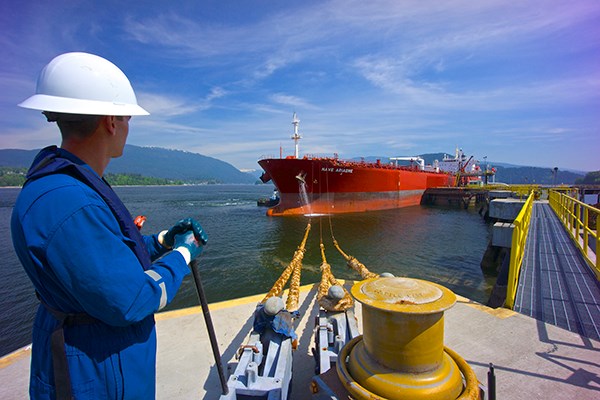The city of Coquitlam wants compensation for Kinder Morgan’s Trans Mountain Expansion Project, which staff said will cost municipal taxpayers $28.5 million over the next 50 years.
On Monday, council unanimously voted to oppose the routing for the pipeline twinning, which follows several roads in the Pacific Reach industrial park. Locating the line under streets means routine municipal road maintenance costs are expected to rise dramatically — and the city said it expects to be compensated.
“[Kinder Morgan] won’t agree to assure us or guarantee that municipal taxpayers aren’t going to be on the hook for the additional costs related to the pipeline,” said Mayor Richard Stewart. “We have always taken the position that a pipeline, particularly a private pipeline… is something that we cannot possibly ask our residents to subsidize.”
Council is directing staff to file a statement of opposition to the alignment with the National Energy Board and has endorsed a proposed Federation of Canadian Municipalities resolution outlining pipeline impacts on local government.
According to a Coquitlam staff report, 30 m on each side of a pipeline is a designated safety zone, requiring approval from the company for work to be conducted in the area.
The document said that construction on adjacent roads ends up costing more for the city because the pipeline must be located and exposed for safety reasons while casing costs are also an issue. Additional expenses can come when the utility needs to be realigned for other underground works.
The report stated that the city is seeking fairer compensation, similar to what private property owners receive when dealing with pipeline companies.
“When it wishes to construct on private property, Trans Mountain must negotiate necessary rights of way from the landowners,” said the staff report. “Unlike municipalities, those landowners have a statutory right to compensation and, much like other private land negotiations, they may negotiate other impact mitigation measures with Trans Mountain.”
Jozsef Dioszeghy, Coquitlam’s general manager of engineering and public works, said the $28.5 million in additional costs is on top of the money the city already collects from the company.
“Hosting such pipelines should not be an ongoing burden on our residents,” he added.
Alli Hounsell, a spokesperson with the Trans Mountain Expansion Project, told The Tri-City News that Kinder Morgan is aware of Coquitlam’s concerns but she disagreed with the city’s costs estimates, noting the company believes the taxes it pays “are fair compensation for what we do in Coquitlam.”
Still, if the city can demonstrate additional costs associated with the pipeline, she said Kinder Morgan would be open to having that conversation in the future.
“We are always happy to have ongoing discussion if [the city] thinks there is something above and beyond and can demonstrate something that is in excess of the taxes,” she said. “They are saying [$28.5 million] is what it would cost. We are saying let’s look at the actual costs.”
@gmckennaTC



